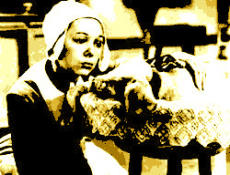Film Review
The first film to feature the comicbook heroine Bécassine
provoked an outrage in Brittany on its release in 1940 for its
unflattering portrayal of a crude Breton stereotype. The
character had in fact been created 35 years earlier by Joseph Pinchon
for a popular girls' magazine named
La
Semaine de Suzette. Interpreted by Paulette Dubost
(bubbling with star quality in one of her few leading roles in a career
that saw her appear in over 150 films, including
a notable part in Jean Renoir's
La Règle du jeu (1939)),
Bécassine has something the original character lacked (a mouth) and uses it to great comic
effect, most notably in one of the film's two musical numbers.
The film was directed by Pierre Caron, who had previously directed two
iconic French singers in similar crowdpleasing comedies - Tino Rossi in
Marinella (1936) and Charles
Trenet in
La Route enchantée
(1938). Caron's career in France was cut short after the war when
he was condemned for links to the black market and ended up making
films in Spain.
Bécassine is far from being Caron's best
work but its rambling, episodic plot is sustained by Paulette Dubost's
unflagging performance as the likeably ill-tempered maid and some
admirable support from Grade A eccentrics Marcel Vallée
(remembered for his portrayal of Muche in cinema's first screen adaptation of
Topaze (1933))
and Alice Tissot, who just manage to be outstaged by an adorable
piglet. It's an amiable little comedy that wears its age
well and perhaps deserves to be better known than it is.
© James Travers 2014
The above content is owned by frenchfilms.org and must not be copied.
Film Synopsis
Bécassine, a young Breton girl, works as a maid for the Marquise
de Grand-Air, who lives with her daughter Annie and Uncle Coretin in a
grand house by the sea. Bécassine resents the fact that
her workload is doubled when her mistress invites a paying guest, Madame
Tampico, to her house, in the company of her daughter Arlette and son
José. When Madame Tampico's precious jewels go missing,
Bécassine is suspected of stealing them but it is Annie's
boyfriend Dr Chancerelle who is arrested, as he was seen loitering on
the grounds of the house on the night of the robbery. In fact,
the jewels have been hidden by José in one of Bécassine's
suitcases, so that his mother can claim on the insurance. When
the Marquise dismisses her maid, Madame Tampico and her children are
thrown into a panic, since she has no doubt left with her
suitcases. Despite their best efforts, Bécassine seems to
have disappeared, along with the jewels...
© James Travers
The above content is owned by frenchfilms.org and must not be copied.



